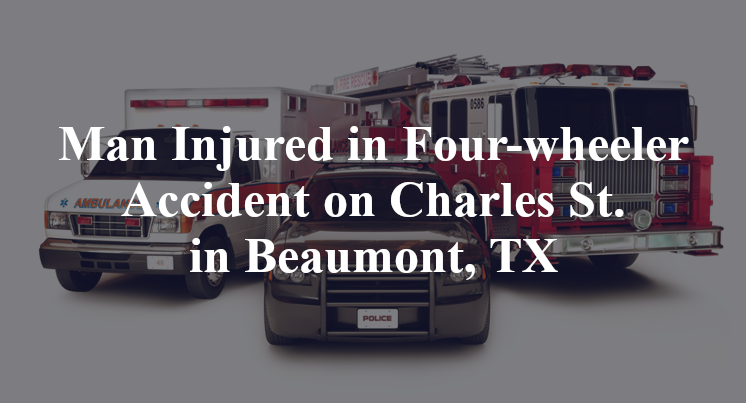Man Injured in Four-wheeler Accident on Charles St. in Beaumont, TX
Jefferson County, TX — September 11, 2024, a man was injured due to a four-wheeler accident at approximately 11:15 p.m. along Charles Street.
According to authorities, a 57-year-old man from Beaumont was traveling on an eastbound four-wheeler on Charles Street in the vicinity west of the Abilene Street intersection when the accident took place.

Officials indicate that, for as yet unknown reasons, the four-wheeler failed to safely maintain its lane of travel. It was consequently involved in a single-vehicle collision in which it apparently overturned, coming to a stop resting on its top on top of its operator.
The man reportedly sustained serious injuries over the course of the accident; he was transported to a local medical facility by EMS in order to receive necessary treatment. Additional details pertaining to this incident—including the identity of the victim—are not available at this point in time.
Commentary
When a four-wheeler flips and lands on its operator, especially late at night on a public road, the question isn’t just what caused the rollover—it’s whether anyone has taken a hard look at why control was lost in the first place.
1. Did the authorities thoroughly investigate the crash?
Single-vehicle incidents involving ATVs often get overlooked as recreational mishaps, but this happened on a public street, and someone left with serious injuries. Did investigators document the scene closely—tracking the ATV’s path, any signs of evasive maneuvers, or indications of speed? Was the roadway examined for uneven pavement, debris, or obstacles that may have contributed to the rollover? Too often, ATV crashes are under-investigated simply because they don’t involve standard vehicles.
2. Has anyone looked into the possibility that a vehicle defect caused the crash?
ATVs are inherently less stable than cars, and a defect in any part of the system—suspension, brakes, steering, or tire integrity—can cause a sudden loss of control. If a mechanical failure caused the operator to overcorrect or the vehicle to tip unexpectedly, that matters. Unless the four-wheeler was secured for inspection, those mechanical questions might never be answered, leaving assumptions to fill in for missing facts.
3. Has all the electronic data relating to the crash been collected?
While many four-wheelers don’t come equipped with full telemetry systems, some modern models do record basic operational data—speed, throttle input, or tilt sensors. If the ATV had aftermarket electronics or a GPS tracking system, that data could help clarify whether the operator was speeding, braking suddenly, or simply lost control without external cause. If a connected device like a phone was in use, it might also explain a delay in response. But any chance to gather that data fades quickly unless someone knows to preserve it.
A late-night rollover involving an ATV isn’t just a freak accident—it’s a moment where something went wrong, and someone got seriously hurt. The question is whether anyone is asking why that happened—or just moving on.
Takeaways:
- ATV crashes on public roads should be treated as serious incidents requiring full scene analysis.
- Mechanical issues like steering or suspension failure could lead to a sudden rollover.
- If available, electronic data from the ATV or connected devices may help explain what triggered the crash.

*We appreciate your feedback and welcome anyone to comment on our blog entries, however all visitor blog comments must be approved by the site moderator prior to showing live on the site. By submitting a blog comment you acknowledge that your post may appear live on the site for any visitors to see, pending moderator approval. The operators of this site are not responsible for the accuracy or content of the comments made by site visitors. By submitting a comment, blog post, or email to this site you acknowledge that you may receive a response with regard to your questions or concerns. If you contact Grossman Law Offices using this online form, your message will not create an attorney-client relationship and will not necessarily be treated as privileged or confidential! You should not send sensitive or confidential information via the Internet. Since the Internet is not necessarily a secure environment, it is not possible to ensure that your message sent via the Internet might be kept secure and confidential. When you fill out a contact or comment form, send us an email directly, initiate a chat session or call us, you acknowledge we may use your contact information to communicate with you in the future for marketing purposes, but such marketing will always be done in an ethical way.